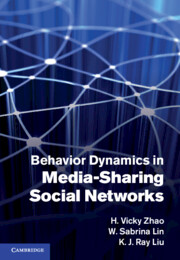Book contents
- Frontmatter
- Contents
- Preface
- Part I Introduction
- Part II Behavior forensics in media-sharing social networks
- Part III Fairness and cooperation stimulation
- Part IV Misbehaving user identification
- 11 Cheating behavior in colluder social networks
- 12 Attack resistance in peer-to-peer video streaming
- Part V Media-sharing social network structures
- References
- Index
11 - Cheating behavior in colluder social networks
from Part IV - Misbehaving user identification
Published online by Cambridge University Press: 28 April 2011
- Frontmatter
- Contents
- Preface
- Part I Introduction
- Part II Behavior forensics in media-sharing social networks
- Part III Fairness and cooperation stimulation
- Part IV Misbehaving user identification
- 11 Cheating behavior in colluder social networks
- 12 Attack resistance in peer-to-peer video streaming
- Part V Media-sharing social network structures
- References
- Index
Summary
Until now we have discussed cooperation stimulation and how side information changes the behavior dynamics in various types of media-sharing social networks. For colluder social networks, as discussed in Chapters 5 and 8, before collusion, colluders need to reach an agreement regarding the fair distribution of the risk of being detected and the reward from illegal usage of multimedia. Chapters 5 and 8 analyze how colluders bargain with one another to achieve fairness of collusion, assuming all colluders report their private information (their received fingerprinted copies) honestly.
In reality, some colluders might break their fair-play agreement. They still wish to participate in and receive reward from collusion, but they do not want to take any risk of being detected by the digital rights enforcer. To achieve this goal, they may lie to other attackers about their fingerprinted copies. For example, they may process their fingerprinted signals before multiuser collusion and use the processed copies instead of the originally received ones during collusion. The cheating colluders' goal is to minimize their own risk while still receiving reward from collusion. Therefore, they select the most effective precollusion processing strategy to reduce their risk.
Precollusion processing reduces the cheating colluders' risk, and makes other attackers have a higher probability than the cheating colluders of being detected. It is obviously a selfish behavior. In some scenarios, precollusion processing can also increase other attackers' probability of being detected; this is not only selfish, but also malicious.
Information
- Type
- Chapter
- Information
- Behavior Dynamics in Media-Sharing Social Networks , pp. 221 - 246Publisher: Cambridge University PressPrint publication year: 2011
